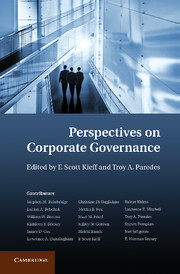Book contents
- Frontmatter
- Contents
- Contributors
- Acknowledgments and Dedication
- PERSPECTIVES ON CORPORATE GOVERNANCE
- Introduction
- PART ONE THE BOARD OF DIRECTORS AND THE CEO
- PART TWO THE WHY, WHEN, HOW, AND HOW MUCH OF EXECUTIVE PAY
- PART THREE CONSTRAINING MANAGERS AND DIRECTORS: INVESTORS, SECURITIES REGULATION, AND THE MEDIA
- 7 Shareholder Activism in the Obama Era
- 8 After Dura: Causation in Fraud-on-the-Market Actions
- 9 From Boardroom to Courtroom to Newsroom: The Media and the Corporate Governance Scandals
- PART FOUR DELAWARE VERSUS CONGRESS: ON THE FEDERALIZATION OF CORPORATE GOVERNANCE
- PART FIVE COMPARATIVE CORPORATE GOVERNANCE
- Epilogue: Three Secular Trends of Corporate Law
- Index
- References
8 - After Dura: Causation in Fraud-on-the-Market Actions
Published online by Cambridge University Press: 04 August 2010
- Frontmatter
- Contents
- Contributors
- Acknowledgments and Dedication
- PERSPECTIVES ON CORPORATE GOVERNANCE
- Introduction
- PART ONE THE BOARD OF DIRECTORS AND THE CEO
- PART TWO THE WHY, WHEN, HOW, AND HOW MUCH OF EXECUTIVE PAY
- PART THREE CONSTRAINING MANAGERS AND DIRECTORS: INVESTORS, SECURITIES REGULATION, AND THE MEDIA
- 7 Shareholder Activism in the Obama Era
- 8 After Dura: Causation in Fraud-on-the-Market Actions
- 9 From Boardroom to Courtroom to Newsroom: The Media and the Corporate Governance Scandals
- PART FOUR DELAWARE VERSUS CONGRESS: ON THE FEDERALIZATION OF CORPORATE GOVERNANCE
- PART FIVE COMPARATIVE CORPORATE GOVERNANCE
- Epilogue: Three Secular Trends of Corporate Law
- Index
- References
Summary
Legal causation is sometimes called “proximate cause” or in recent years “loss causation” in federal securities cases. We have already observed that the proliferation of terms to describe causation in the federal securities law is not helpful. … What other field of law alternatively refers to causation in terms of an “in connection with” element; cause in fact; causal nexus; transactional causation; loss causation; legal cause; proximate cause; but for causation; or simply causation? This etymological mishmash is a breeder of confusion concerning both the cause in fact and the legal causation elements.
The Supreme Court decision in Dura was notable for … how limited its impact is likely to be on future securities class actions. … The question is not must the plaintiff plead and prove that the defendant was responsible for the plaintiff's loss, but rather, how does the plaintiff plead and prove such responsibility. Here Dura is strikingly limited in its significance.
On April 19, 2005, the Supreme Court announced its unanimous opinion in Dura Pharmaceuticals, Inc. v. Broudo, concerning what a plaintiff must show to establish causation in a Rule 10b-5 fraud-on-the-market suit for damages. The opinion had been awaited with considerable anticipation, being described at the time of oral argument in the Financial Times, for example, as the “most important securities case in a decade.” After the opinion was handed down, a representative of the plaintiffs' bar lauded it as a “unanimous ruling protecting investors' ability to sue.”
- Type
- Chapter
- Information
- Perspectives on Corporate Governance , pp. 235 - 292Publisher: Cambridge University PressPrint publication year: 2010
References
- 2
- Cited by



